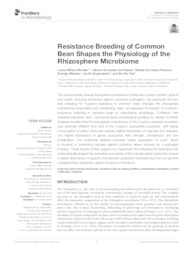Resistance breeding of common bean shapes the physiology of the rhizosphere microbiome.
Resistance breeding of common bean shapes the physiology of the rhizosphere microbiome.
Author(s): MENDES, L. W.; CHAVES, M. G. de; FONSECA, M. de C.; MENDES, R.; RAAIJMAKERS, J. M.; TSAI, S. M.
Summary: Abstract: The taxonomically diverse rhizosphere microbiome contributes to plant nutrition, growth and health, including protection against soil-borne pathogens. We previously showed that breeding for Fusarium-resistance in common bean changed the rhizosphere microbiome composition and functioning. Here, we assessed the impact of Fusarium-resistance breeding in common bean on microbiome physiology. Combined with metatranscriptome data, community-level physiological profiling by Biolog EcoPlate analyses revealed that the rhizosphere microbiome of the Fusarium-resistant accession was distinctly different from that of the Fusarium-susceptible accession, with higher consumption of amino acids and amines, higher metabolism of xylanase and sialidase, and higher expression of genes associated with nitrogen, phosphorus and iron metabolism. The resistome analysis indicates higher expression of soxR, which is involved in protecting bacteria against oxidative stress induced by a pathogen invasion. These results further support our hypothesis that breeding for resistance has unintentionally shaped the assembly and activity of the rhizobacterial community toward a higher abundance of specific rhizosphere competent bacterial taxa that can provide complementary protection against fungal root infections.
Publication year: 2019
Types of publication: Journal article
Unit: Embrapa Environment
Observation
Some of Embrapa's publications are published as ePub files. To read them, use or download one of the following free software options to your computer or mobile device. Android: Google Play Books; IOS: iBooks; Windows and Linux: Calibre.
Access other publications
Access the Agricultural Research Database (BDPA) to consult Embrapa's full library collection and records.
Visit Embrapa Bookstore to purchase books and other publications sold by Embrapa.

